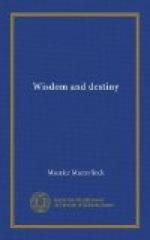42. This was the Roman fashion of accepting the greatest sorrow that can befall a man at the moment when sorrow is felt the most keenly— at the moment of his greatest happiness. And there are many ways of accepting misfortune—as many, indeed, as there are generous feelings or thoughts to be found on the earth; and every one of those thoughts, every one of those feelings, has a magic wand that transforms, on the threshold, the features and vestments of sorrow. Job would have said, “The Lord gave and the Lord hath taken away: blessed be the name of the Lord”; and Marcus Aurelius perhaps, “If it be no longer allowed me to love those I loved high above all, it is doubtless that I may learn to love those whom I love not yet.”
43. And let us not think that these are mere empty words wherewith they console themselves, words that in vain seek to hide the wound that bleeds but the more for the effort. But if it were so, if empty words could console, that surely were better than to be bereft of all consolation. And further, if we have to admit that all this is illusion, must we not, in mere justice, also admit that illusion is the solitary thing that the soul can possess; and in the name of what other illusion shall we venture to rate this illusion so lightly? Ah, when the night falls and the great sages I speak of go back to their lonely dwelling, and look on the chairs round the hearth where their children once were, but never shall be again— then, truly, can they not escape some part of the sorrow that comes, overwhelming, to those whose suffering no noble thought chastens. For it were wrong to attribute to beautiful feeling and thought a virtue they do not possess. There are, external tears that they cannot restrain; there are holy hours when wisdom cannot yet console. But, for the last time let us say it, suffering we cannot avoid for suffering there ever must be; still does it rest with ourselves to choose what our suffering shall bring. And let us not think that this choice, which the eye cannot see, is truly a very small matter, and helpless to comfort a sorrow whose cause the eyes never cease to behold. Out of small matters like




